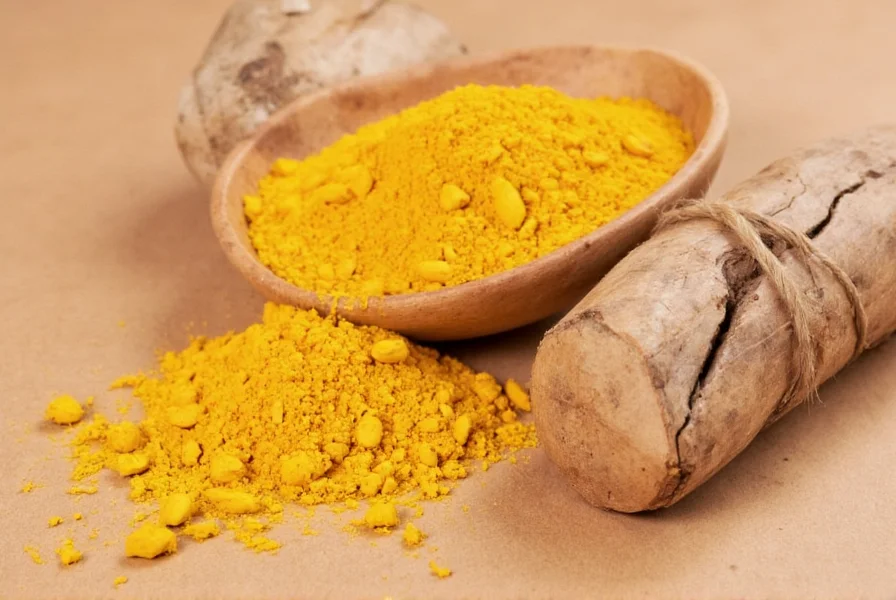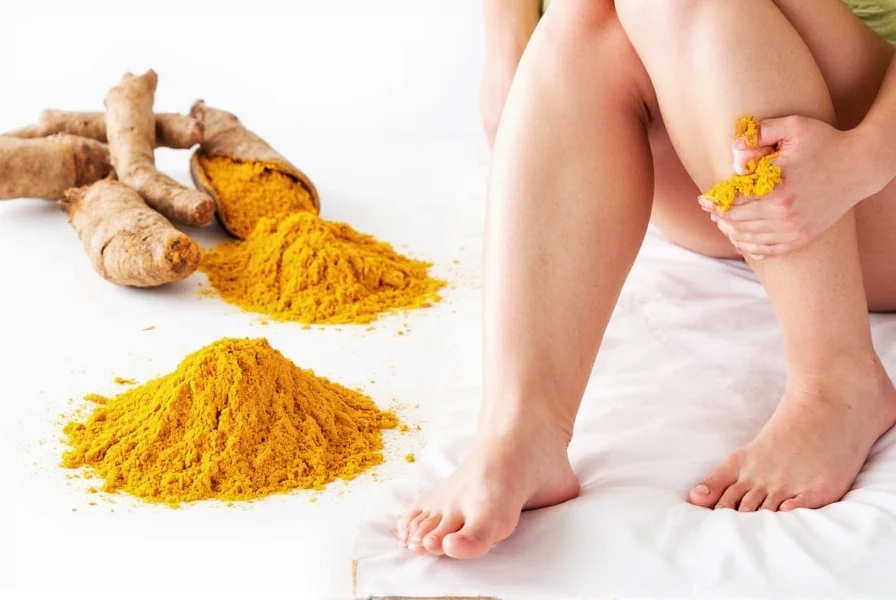Arthritis affects millions worldwide, driving many to seek natural alternatives alongside conventional treatments. Turmeric, a vibrant yellow spice used for centuries in traditional medicine, has gained significant attention for its potential joint health benefits. This article examines what current research reveals about turmeric's effectiveness for arthritis, separating scientific evidence from popular claims.
The Science Behind Turmeric and Joint Health
Turmeric contains curcumin, a polyphenol with potent anti-inflammatory and antioxidant properties. Chronic inflammation plays a key role in both osteoarthritis (OA) and rheumatoid arthritis (RA), making curcumin's mechanisms particularly relevant. Unlike nonsteroidal anti-inflammatory drugs (NSAIDs) that block specific inflammatory pathways, curcumin appears to modulate multiple inflammatory markers simultaneously.
However, curcumin faces significant bioavailability challenges. When consumed alone, it's poorly absorbed, rapidly metabolized, and quickly eliminated from the body. This explains why many early studies using plain turmeric powder showed minimal effects. Modern formulations address this through:
- Piperine (black pepper extract) combinations
- Liposomal delivery systems
- Phospholipid complexes
- Nanoparticle formulations
Clinical Evidence: What Research Shows
Multiple systematic reviews and meta-analyses have evaluated turmeric's effectiveness for arthritis. A 2022 review in Phytotherapy Research analyzed 11 clinical trials involving 1,236 arthritis patients. The analysis revealed:
| Arthritis Type | Study Duration | Pain Reduction | Compared to NSAIDs |
|---|---|---|---|
| Osteoarthritis | 8-12 weeks | 20-45% improvement | Slightly less effective |
| Rheumatoid Arthritis | 8-12 weeks | 30-50% improvement | Comparable to low-dose NSAIDs |
| General Inflammation | 4-8 weeks | 25-40% reduction in CRP | Less potent than prescription options |
These findings align with a 2023 study published in Arthritis Care & Research where participants taking 1,500 mg daily of enhanced-curcumin experienced significantly greater pain reduction than placebo after 12 weeks. Notably, the curcumin group reported fewer gastrointestinal side effects than those taking conventional NSAIDs.

How Turmeric Compares to Conventional Treatments
While turmeric shows promise, it's crucial to understand its place in arthritis management. Research consistently indicates that curcumin:
- Provides modest symptom relief compared to placebo
- Generally shows less effectiveness than prescription medications for moderate to severe arthritis
- May serve as a complementary approach alongside conventional treatments
- Typically causes fewer side effects than NSAIDs or corticosteroids
A 2021 head-to-head trial in The Journal of Alternative and Complementary Medicine found that while curcumin reduced pain by approximately 40%, celecoxib (a prescription NSAID) achieved 60% reduction. However, the curcumin group had significantly better gastrointestinal tolerance.
Practical Considerations for Arthritis Management
If considering turmeric for arthritis symptoms, several factors deserve attention:
Dosage and Formulation
Research suggests effective doses range from 500-1,500 mg of enhanced curcumin daily. Standard turmeric powder requires much higher doses (3,000-8,000 mg) due to low curcumin concentration (only 2-8% by weight) and poor absorption. Look for products specifying:
- Curcumin content (not just "turmeric")
- Bioavailability enhancement method
- Third-party testing verification
Safety Profile
Turmeric is generally well-tolerated at recommended doses. Potential side effects include:
- Mild digestive upset (nausea, diarrhea)
- Increased bleeding risk when combined with blood thinners
- Interactions with diabetes medications
- Potential gallbladder contractions in susceptible individuals

Realistic Expectations
Managing arthritis with turmeric requires patience and realistic expectations. Most studies show symptom improvement takes 4-8 weeks of consistent use. Turmeric works best as part of a comprehensive approach including:
- Regular low-impact exercise
- Weight management
- Conventional medical treatments as prescribed
- Other evidence-based complementary approaches
Limitations in Current Research
Despite promising results, several limitations exist in the turmeric-arthritis research:
- Most studies are short-term (8-12 weeks), with limited long-term safety data
- Small sample sizes in many clinical trials
- Variability in curcumin formulations makes comparisons difficult
- Lack of standardized dosing protocols
- Insufficient research on severe arthritis cases
Researchers consistently call for larger, longer-term studies with standardized formulations. The Arthritis Foundation notes that while evidence supports turmeric's potential benefits, more rigorous research is needed before definitive treatment recommendations can be made.
When to Consult Your Healthcare Provider
Before adding turmeric supplements to your arthritis management plan, consult your healthcare provider, especially if you:
- Take blood thinners, diabetes medications, or acid-reducing drugs
- Have gallbladder issues or kidney stones
- Are pregnant or breastfeeding
- Experience severe joint pain or swelling
- Notice worsening symptoms despite treatment
Your doctor can help determine if turmeric might complement your current treatment regimen and advise on appropriate dosing and formulation. Never replace prescribed arthritis medications with turmeric without medical supervision.
Conclusion
Current evidence suggests turmeric, particularly enhanced-curcumin formulations, can provide modest relief for some arthritis symptoms. While not a replacement for conventional treatments, it may serve as a valuable complementary approach with a favorable safety profile. The most significant benefits appear to come from high-quality, bioavailable formulations taken consistently over several weeks. As research continues to evolve, turmeric's role in arthritis management may become better defined, but for now, it represents one potential tool among many in a comprehensive arthritis care strategy.
Frequently Asked Questions
How long does it take for turmeric to work for arthritis pain?
Most clinical studies show symptom improvement takes 4-8 weeks of consistent daily use. Some people report noticing reduced inflammation within 2-3 weeks, but maximum benefits typically require at least one month of regular supplementation with a high-quality, bioavailable curcumin formulation.
What's the best turmeric supplement for arthritis?
The most effective turmeric supplements for arthritis contain enhanced-curcumin formulations with proven bioavailability, such as those combined with piperine (black pepper extract), phospholipids, or using nanoparticle technology. Look for products providing 500-1,500 mg of standardized curcuminoids daily with third-party testing verification. Avoid products that only list "turmeric" without specifying curcumin content.
Can turmeric replace my arthritis medication?
No, turmeric should not replace prescribed arthritis medications. Research shows it provides more modest symptom relief compared to conventional treatments. It may serve as a complementary approach alongside your current treatment plan, but never discontinue prescribed medications without consulting your healthcare provider. Turmeric works best as part of a comprehensive arthritis management strategy.
Does turmeric help with rheumatoid arthritis specifically?
Yes, several studies specifically examining rheumatoid arthritis show turmeric can help reduce disease activity scores, joint tenderness, and inflammatory markers. A 2020 study in Clinical Interventions in Aging found that 500 mg of enhanced curcumin twice daily significantly improved symptoms compared to placebo after 12 weeks. However, it's generally less effective than disease-modifying antirheumatic drugs (DMARDs) for controlling RA progression.
Are there any risks of taking turmeric with arthritis medications?
Turmeric may interact with certain arthritis medications, particularly blood thinners and NSAIDs. It can increase bleeding risk when combined with anticoagulants and may enhance the effects of NSAIDs, potentially increasing side effects. Always consult your healthcare provider before combining turmeric supplements with prescription arthritis medications to ensure safe use and appropriate dosing adjustments.










 浙公网安备
33010002000092号
浙公网安备
33010002000092号 浙B2-20120091-4
浙B2-20120091-4